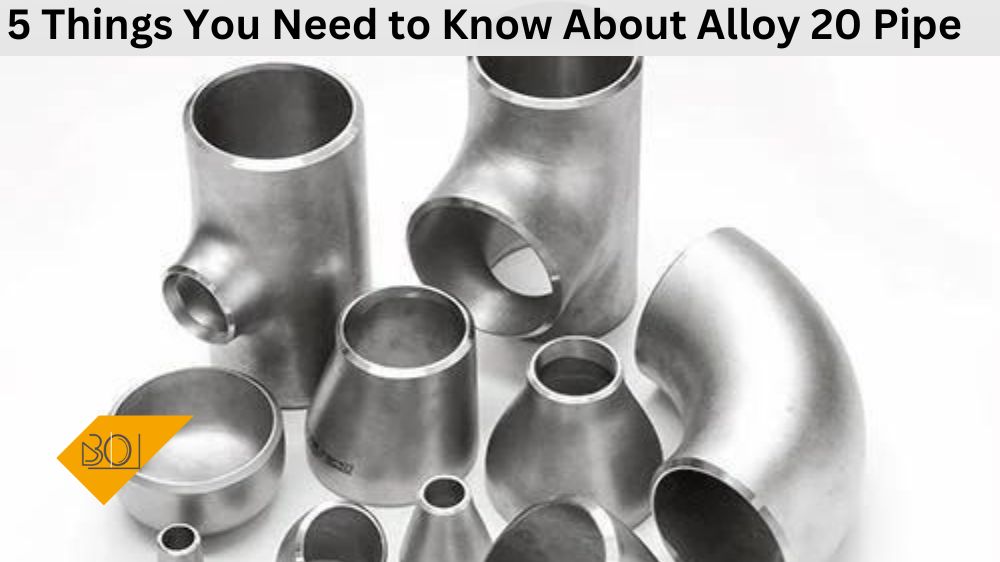Alloy 20 is a highly resistant material with increasing demand in the piping industry. It is made of nickel, molybdenum, and chromium, giving it superior corrosion resistance and cracking. However, its unique composition and properties can make it challenging to work with if you need to become more familiar. In this blog post, we will discuss five essential things you need to know about Alloy 20 piping to help you understand its applications and benefits.
What is Alloy 20 Pipe?
Alloy 20 pipe is a nickel-iron-chromium alloy with excellent corrosion resistance in sulfur or chloride acids. It’s resistant to intergranular corrosion, stress corrosion cracking and resists localized attack from pitting and crevice corrosion. The alloy has good general corrosion and excellent hot sulfuric acid media resistance. It also offers superior mechanical properties compared to other stainless steel pipes of the same grade due to its higher nickel content which increases its toughness and strength at elevated temperatures making it an ideal choice for many commercial applications.
5 Things About Alloy 20 Pipe
Chemical Composition
The composition of Alloy 20 is unique, consisting of 35 per cent nickel, 20 per cent chromium, 3 per cent molybdenum, and 2.5 per cent copper. The combination of these components provides superior corrosion resistance and durability in harsh environments. The addition of copper also enhances its resistance to sulfuric acid, making it an ideal material for applications in the chemical and petrochemical industries.
Applications
Alloy 20 is a versatile material with broad applications across different industries. It is the material for handling corrosive fluids, acids, and gases in chemical and petrochemical plants. It is also used to produce pharmaceuticals, plastics, and food processing. The high resistance to temperature and pressure makes it suitable for piping in high-pressure levels in the oil and gas industries.
Unique Properties
Alloy 20 has unique properties that distinguish it from other piping materials. It has excellent resistance to stress-corrosion cracking and pitting corrosion under extreme conditions. It also has low levels of susceptibility to intergranular corrosion, making it durable and long-lasting. The material can withstand temperatures up to 1000°F and pressures up to 3000 psi. These unique properties make Alloy 20 a popular choice for harsh conditions.
Fabrication and Welding
Fabricating and welding Alloy 20 is more challenging than other materials due to its unique composition. Therefore, it is crucial to have a strong grip on the right techniques and tools to achieve a stable and strong pipe structure. The right welding technique will enhance corrosion, cracking, and temperature resistance. Therefore, it is essential to work with the right tube supplier who can provide the necessary guidance for successful fabrication and welding.
Maintenance
Alloy 20 is a long-lasting material that requires minimal maintenance. Nevertheless, it is essential to have routine inspections to prevent any corrosion or damage that might interfere with its performance. It is also vital to use compatible fittings and fasteners during installation and avoid contact with incompatible materials that might cause chemical changes leading to corrosion.
Physical properties of Alloy 20 Pipe
Alloy 20 pipe is the stainless steel alloy most commonly used in industrial and commercial applications. It has high resistance to pitting, crevice corrosion, chloride-induced stress cracking and excellent mechanical properties in extreme temperatures. This makes it ideal for various applications, including petrochemical plants, power generation facilities, food processing operations and chemical refining systems. Its composition includes Nickel (Ni), Chromium (Cr) and Molybdenum (Mo). These components provide increased strength at elevated temperatures while maintaining superior resistance to corrosive media compared to similar alloys on the market.
Conclusion
Alloy 20 is a unique material highly resistant to corrosion, high temperatures, and stress corrosion cracking. Its unique composition and properties make it ideal for demanding applications in numerous industries, including chemical, petrochemicals, and oil and gas. It offers long-lasting durability and minimal maintenance, making it a cost-effective option. However, proper fabrication, welding, and maintenance are crucial to achieving high-performance standards. As elaborated in this blog post, understanding the five essential things about Alloy 20 piping will help you make informed decisions.

